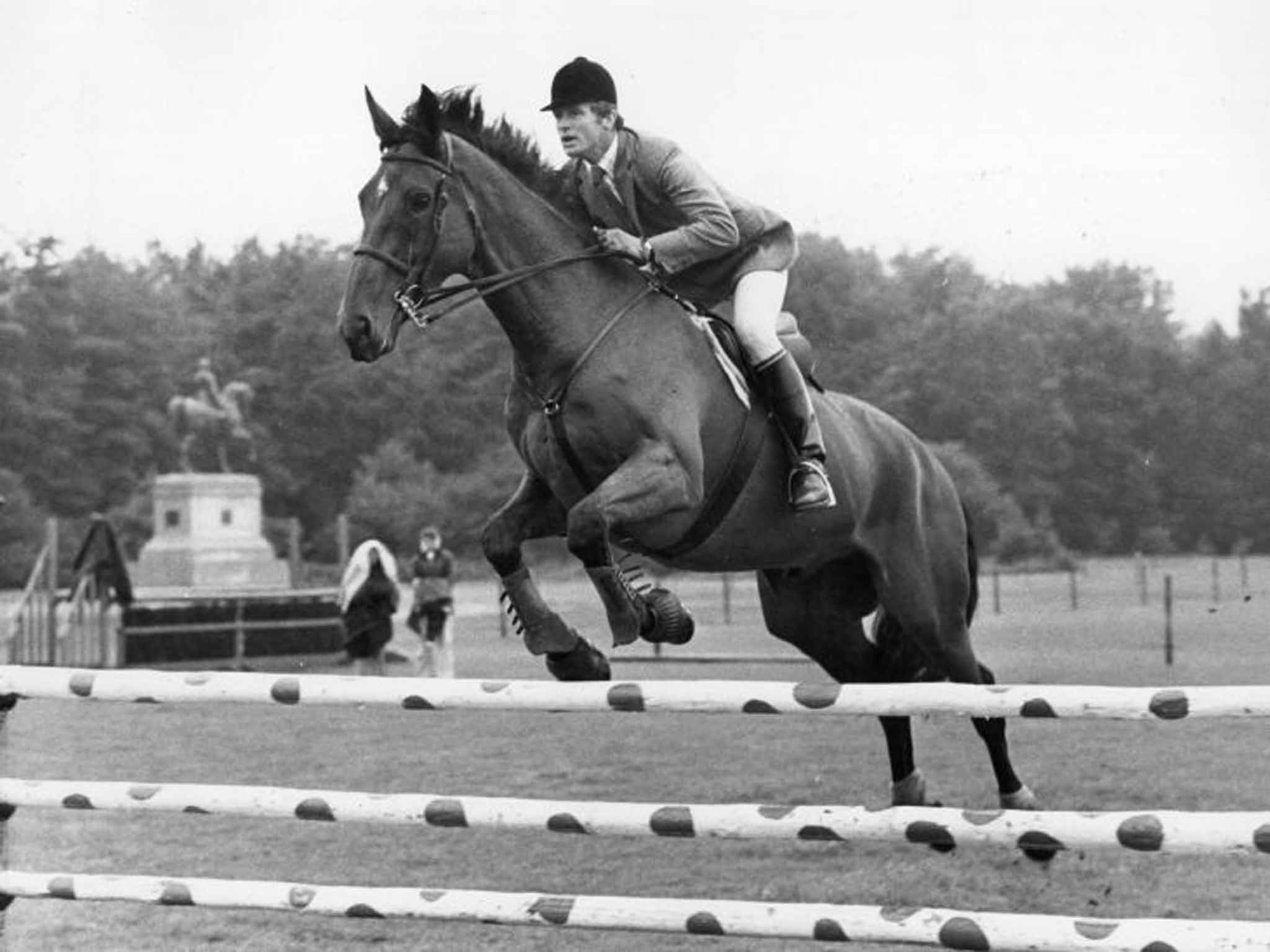Richard Meade: Britain's most successful Olympic equestrian, a towering presence in the world of eventing for two decades
Meade was briefly linked romantically with Princess Anne, but she eventually married their Munich team-mate Mark Phillips

Richard Meade was this country's most successful Olympic equestrian and the first British rider to win an individual Olympic title, which he did at the 1972 Munich Olympics. With his dashing good looks and golden locks he was a linchpin of the British three-day event team for 21 years. In individual and team events he won three Olympic golds as well as five golds, three silvers and two bronzes at the world and European championships. It is a testimony to his skill that he had such longevity in such a physically demanding sport and succeeded on so many different horses.
"Richard, at the height of his powers, towered over the eventing world," the British Eventing chairman Hugh Thomas said. "His results far exceeded the innate ability of many of the horses he rode, and he was at his very best when riding at the major events and championships."
Meade competed in four successive Olympics, carrying the British flag in the closing ceremony at Munich, as well as at Fontainebleau, France, in 1980, the substitute event held in the wake of the Moscow boycott that year. He won the Badminton Horse Trials in 1970 and 1982 and the Burghley Horse Trials once. He also served as president of the British Equestrian Federation and chairman of the British Horse Society.
Following his two Olympic golds in Munich, he was voted 1972 BBC Wales Sports Personality of the Year and came third in the BBC Sports Personality of the Year, while being part of the team that won the Team of the Year award. He was also awarded the British Equestrian Federation's medal of honour.
In retirement he recognised that Britain had a somewhat haphazard approach to breeding sports horses, especially when the increasing technical demands of show jumping and dressage started to favour the "warmbloods" of continental Europe, whose breeding had been refined over generations of encouragement and state subsidy. So in 1991 he co-founded the British Horse Foundation, aiming to apply some of these principles and deter indiscriminate breeding; he remained chairman of its trustees until his death.
Born in Chepstow, Monmouthshire in 1938, he came from an equestrian family. His parents, John and Phyllis (née Watts) were joint masters of the Curre Hounds at Itton. Meade started riding at the age of seven, going on hunts with his parents. He was inspired by his fellow Welshman Sir Harry Llewellyn, who was a member of the GB show-jumping team that won gold at the 1950 Helsinki Olympics; he mentored Meade in his early career and lent him a horse on which he won his first cup, at the Pony Club Championships in 1954.
Meade was schooled at Lancing College before reading engineering at Magdalene College, Cambridge, where he was also a member of the Hawks' Club. After completing his National Service with the 11th Hussars he was a freelance racing correspondent for The Times, and then worked for the merchant bankers Antony Gibbs & Sons before turning his full-time attention to equestrianism.
Meade first gained recognition at Burghley on Barberry in 1964 after winning the three-day event, which combines dressage, cross-country and show-jumping; they were subsequently chosen for the Tokyo Olympics, where he debuted as a three-day eventer, finishing eighth, best-placed of the British riders.
Four years later in Mexico his clear round on Cornishman, following a tropical downpour in the final show-jumping stage, secured the team title. "A violent tropical storm nearly caused abandonment of the competition," he recalled. "Four and a half inches of rain fell in just over an hour. However, we survived it all, and that made winning all the more exciting."
He felt Mexico was his greatest Olympic memory, and the Mexicans his favourite hosts. "The events didn't necessarily start on time but when they did hats were flung into the air, music rang out and voices cheered - for sheer enjoyment no Olympics have bettered Mexico."
As Meade's experience grew so did his standing in the British team. His cool head meant that he was often selected to go last in team events when the pressure was at its most intense. His greatest triumph came in Munich in 1972: he jumped two faultless rounds Laurieston and helped Britain retain the title, as well as winning Britain's first individual equestrian gold; his individual clear round earned him a standing ovation from the crowd of 28,000. Meade was briefly linked romantically with Princess Anne, but she eventually married their Munich team-mate Mark Phillips.
His last Olympics were in Montreal in 1976, where he finished fourth individually. After the partial boycott of the 1980 Moscow Olympics he was not selected in 1984. When he retired he was sixth on the list of Britain's most successful Olympians; he currently stands joint 11th.
In retirement his projects included a property company, but above all he trained horses and mentored young riders: "You start a new career every time you begin with a new young horse," he remarked. His son Harry became a British event rider, winning a team silver in last year's World Equestrian Games.
Meade was also an FEI judge and cross-country course designer, and a respected judge of show hunters. Described by the British Horse Society president as "probably the best competitive rider we've ever seen", he died of cancer after being diagnosed last October.
Richard John Hannay Meade, horse rider and trainer: born Chepstow, Monmouthshire 4 December 1938; OBE 1974; married 1977 Angela Farquhar (one daughter, two sons, and one son deceased); died West Littleton, Gloucestershire 8 January 2015.
Subscribe to Independent Premium to bookmark this article
Want to bookmark your favourite articles and stories to read or reference later? Start your Independent Premium subscription today.

Join our commenting forum
Join thought-provoking conversations, follow other Independent readers and see their replies